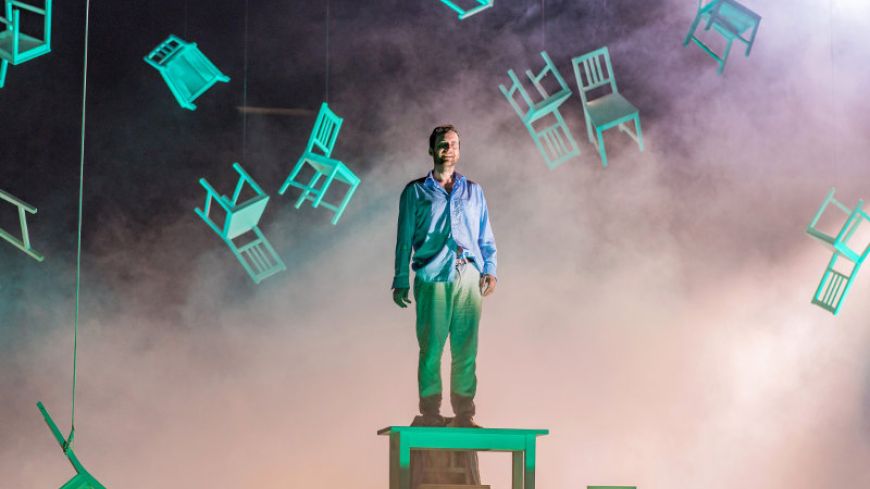
Ionesco’s Rhinoceros, in a new version by Zinnie Harris, is served as a timely warning of the threat mass conformity poses to the values of freedom and democracy.
It has been well documented that Ionesco belatedly wrote Rhinoceros (in 1959) as a response to witnessing the rise of fascism in his home country of Romania, in the build-up to World War II. Watching close friends and family persuaded into joining the Iron Guard or ‘Greenshirts’ had a profound effect, leading to a terror of political zealotry of any kind. Harris’s adaptation, in association with DOT Theatre Istanbul, comes at a time when nationalism is once again on the rise in the West and, to the East, Turkey is facing unprecedented limits on freedom of expression. The current world climate is therefore ripe for a retelling of Ionesco’s surreal drama.
Our hero, Berenger, is having an awkward meeting with his friend Jean in a local café, when a rhinoceros comes rampaging down the street. There’s some animated discussion about whether the rhino is from the Middle East or Europe (did it have one horn or two?) and the resident logician earnestly reveals, through syllogistic reasoning, that Socrates was a cat and so feels better about the whole rhinoceros thing having properly – that is theoretically - understood and defined the problem. But one by one, everyone in Berenger’s world turns into a rhinoceros, until he is the last man standing.
The play is packed with relevance, touching on a diversity of issues that range from migration, through women not being heard, to fake news and a whole lot more besides. It is as funny as it is shocking. The rhinoceros’ philosophy of looking after number one, thinking only of yourself and your own goals as summed in their ‘fuck, fight, trample’ mantra, feels chillingly close to home.
Everything that appears on stage is startlingly white, with colours provided through Chris Davey’s lighting, often neon, often inducing just the right vertiginous effect. Composer and musician Oğuz Kaplangi sits onstage creating a soundscape so integral that it slips by barely noticed, adding unobtrusively to the drama in the way that the foremost film scores do.
Robert Jack is a likeable, sympathetic Berenger and Steven McNicoll gives a virtuoso performance as his friend Jean. But this is an ensemble production with no weak links, the ten-strong performers leading this fast-paced production through to its clear and illogical conclusion.
Runs until 7th April

